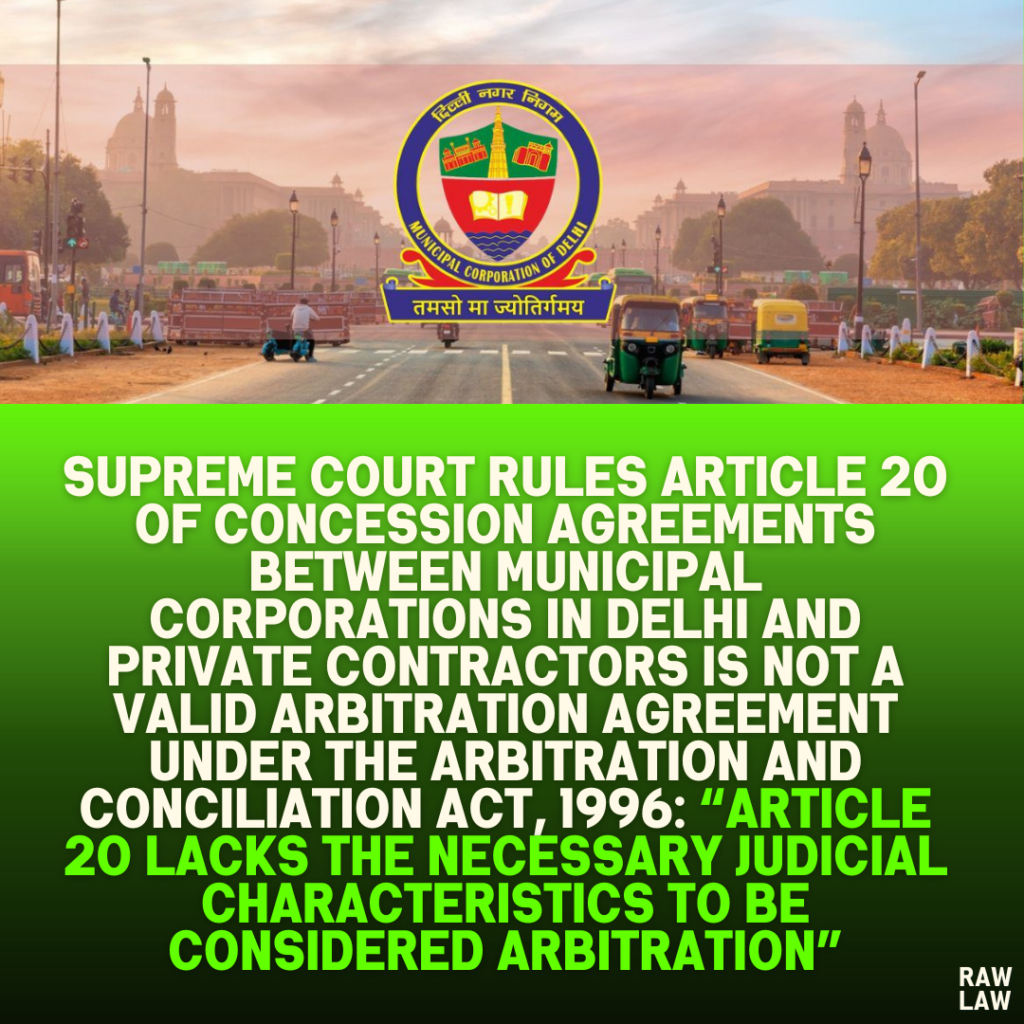Court’s Decision
The Supreme Court held that Article 20 of the Concession Agreements executed between Municipal Corporations in Delhi and private contractors does not constitute a valid arbitration agreement under the Arbitration and Conciliation Act, 1996. The Court set aside the Delhi High Court’s judgments in the SMS Ltd. and CCC Ltd. cases, which had construed Article 20 as an arbitration clause, and upheld the High Court’s contrary decision in the DSC Ltd. case.
The Court observed:
“Article 20 lacks the judicial element that lends arbitration its distinct credibility as an adjudicatory mechanism. It is not an arbitration clause either in letter, or in spirit and effect.”
Facts
The appeals concerned disputes arising from Concession Agreements entered into for the development of parking and commercial complexes on a Design, Build, Finance, Operate, and Transfer (DBFOT) basis:
- SMS Ltd. alleged SDMC failed to grant timely approvals, leading to project delays. A public interest petition halted the project, after which SMS Ltd. sought to terminate the agreement and invoked Article 20 for dispute resolution.
- DSC Ltd. claimed MCD failed to provide an encumbrance-free site and terminated the contract. DSC sought INR 406 crores in damages and referred the dispute under Article 20.
- CCC Ltd. also raised a demand for compensation and invoked Article 20, which the High Court held to be an arbitration clause.
In all cases, the interpretation of Article 20 as either a mediation clause or an arbitration clause was central to the dispute.
Issues
Whether Article 20 of the Concession Agreements constitutes a valid arbitration agreement under Section 7 of the Arbitration and Conciliation Act, 1996.
Petitioner’s Arguments (SDMC/MCD)
- Relied on South Delhi Municipal Corporation v. SMS AAMW Tollways (P) Ltd. to argue that similarly worded clauses were held not to be arbitration agreements.
- Article 20 lacks essential attributes of arbitration such as impartiality, binding adjudication by a neutral forum, and statutory compliance.
- The clause merely refers to mediation by the MCD Commissioner.
- Contractors themselves initially acknowledged the absence of an arbitration clause.
- Conduct of private parties (e.g., issuing Section 80 CPC notices) implied an intention to pursue civil remedies, not arbitration.
Respondent’s Arguments (Contractors)
- Argued Article 20 implied arbitration, pointing to a structured process involving submission of documents, review, and a final decision.
- Cited decisions such as K.K. Modi v. K.N. Modi and MTNL v. Canara Bank, asserting form is less important than intent.
- Alleged MCD had, in other contracts, treated similar clauses as arbitration agreements.
- Claimed MCD’s participation in earlier arbitration processes amounted to waiver.
- Emphasized that State bodies should not rely on vague drafting to escape arbitration commitments.
Analysis of the Law
- The Court examined Section 7 of the Arbitration Act and international jurisprudence, holding that a valid arbitration agreement must:
- Clearly manifest an intent to arbitrate,
- Provide for binding adjudication, and
- Adhere to core arbitration norms (impartiality, adversarial process, appointment by both parties).
Precedent Analysis
- The Court reaffirmed its decision in SMS AAMW Tollways (P) Ltd. and held that the decision in DSC Ltd. correctly applied the principles in that case.
- It rejected attempts to distinguish these appeals from Tollways based merely on procedural differences.
Court’s Reasoning
- Article 20 was titled “Mediation by Commissioner,” with no reference to “arbitration,” “arbitrator,” or the Arbitration Act.
- The clause involved a fact-finding process by an MCD officer, lacked mutual selection of the adjudicator, and provided no mechanism for impartial decision-making or adversarial proceedings.
- Finality of decisions under Article 20 did not make the process arbitral; similar finality exists in departmental decisions or expert determinations.
- The clause did not allow for cross-examination, oral hearings, or application of evidence rules.
The Court noted:
“While certain textual elements—such as the use of the phrase ‘final and binding’—may superficially resemble arbitration, a deeper examination reveals…structural deficiencies.”
Conclusion
The Supreme Court held:
- Article 20 does not amount to an arbitration agreement under Section 7.
- High Court judgments in SMS Ltd. and CCC Ltd. are set aside.
- High Court judgment in DSC Ltd. is upheld.
- All parties are free to pursue other remedies in accordance with law.
Implications
The judgment delivers clarity on what constitutes a valid arbitration clause and sends a strong message against vague or poorly drafted dispute resolution provisions. The Court lamented that:
“A legal dispute that lingers for years over the mere mode of adjudication…is akin to a traveller stranded at a crossroads, endlessly debating which path to take while the journey itself remains unbegun.”
Further, the Court cautioned lawyers and legal advisors:
“Their professional credentials will not earn any stripes if they indulge in such juggling of words… Personal liability must be assigned…along with the harshest punitive measures.”


![Bombay High Court Remands Appeals to Commissioner of Income Tax (Appeals) [CIT(A)] in Transponder Royalty Dispute: “Absence of Foundational Facts and Agreement Analysis Makes All Orders Non-Speaking” 2 Bombay High Court Remands Appeals to Commissioner of Income Tax (Appeals) [CIT(A)] in Transponder Royalty Dispute: “Absence of Foundational Facts and Agreement Analysis Makes All Orders Non-Speaking”](https://rawlaw.in/wp-content/uploads/2025/05/White-Minimalist-Economics-Headline-News-Instagram-Post-1-10-96x96.png)

Pingback: Bombay High Court Dismisses Appeal in Agricultural Land Possession Dispute — "Unregistered Sale Agreement Post Section 17(1A) of Registration Act Cannot Confer Protection Under Section 53A of Transfer of Property Act" - Raw Law